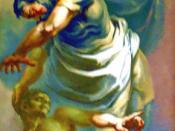The divine command theory states that something is right or wrong if God commands or forbids it. The theory states that ethical requirements derive from God's commands. The concept is an example of a metaethical theory, one which strives to investigate and clarify the meaning and use of ethical expressions, such as "good", which we see contained within the divine command theory.
Several obstacles arise in attempting to clarify what the divine command theory is composed of, and how to interpret the rationale behind it. The first impediment would be the definition or description of what is meant by God as used in the divine command theory. The description of God must be both substantial and rational in order to provide a basis for the process of the divine command theory. The substantial aspect of the meaning of God would have to be consistent or related to substance, indicating that the description or depiction is not imaginary or illusory.
The rational aspect of the description of God would have to relate to, or be based on reason. The description of what is meant by God in the definition of the divine command theory has to be theologically substantial and rational.
Supposing that a person could provide a rational analysis on what is meant by God, therefore overcoming the first obstacle, one would have to provide the basis on which we could presume there was a God who in fact existed, which is the second obstacle. Descartes chose two arguments for the proof that God exists, the ontological argument and the cosmological argument. If one chose to accept either of these arguments, among others, then this obstacle, the one that strives to search out an existent God, could be proven irrelevant.
Supposing that someone could provide theists and atheists alike...


